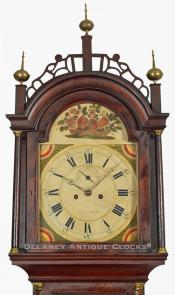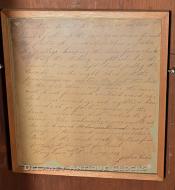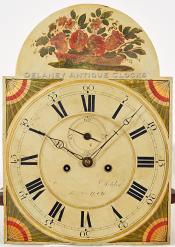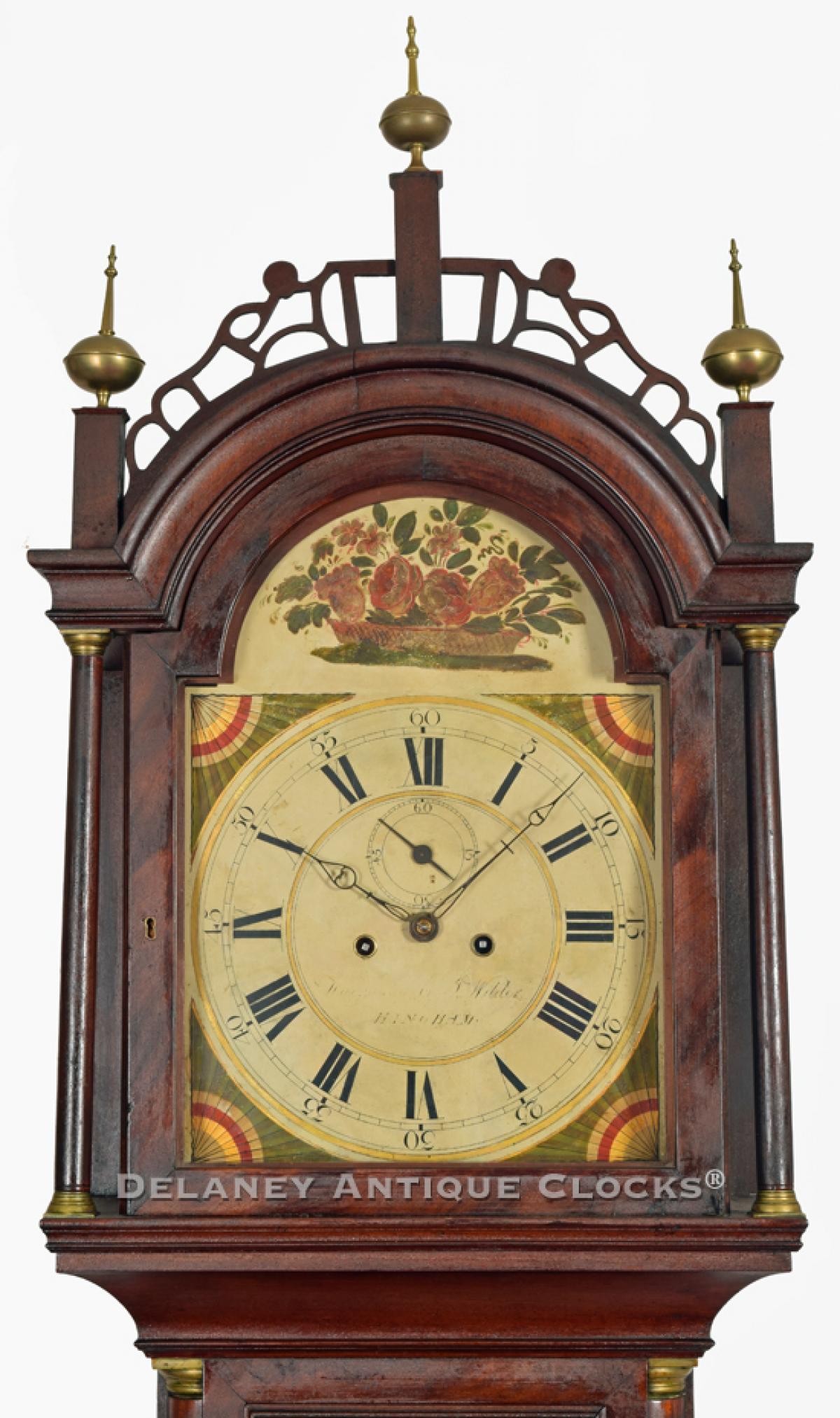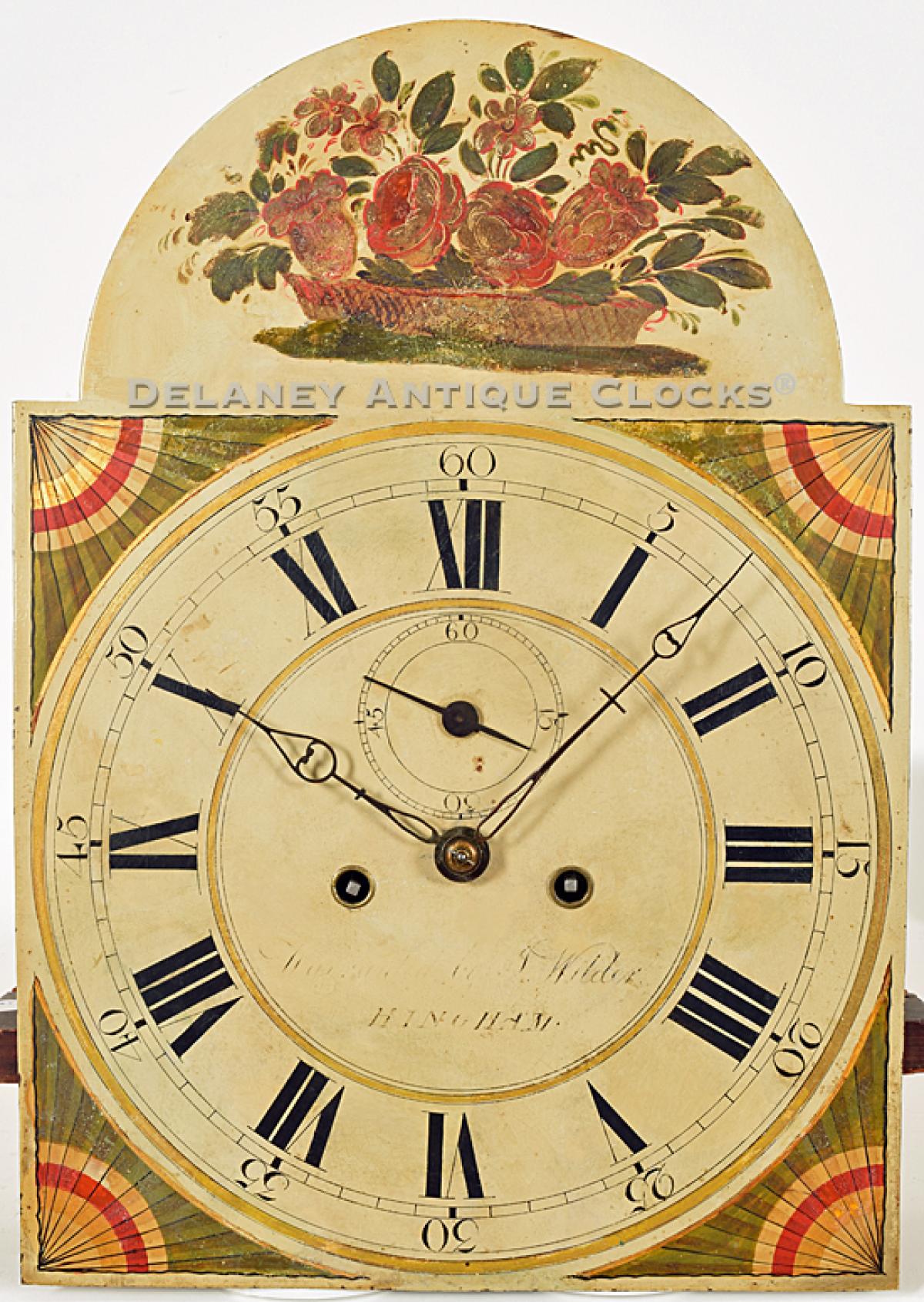Joshua Wilder. Hingham, Mass Clockmaker. A fine cross-banded mahogany cased tall clock. The original hand written instructions on the procedure to set up the clock and the pricing is inside the case. This is signed by the Clockmaker in his hand. XXSL-40.
Joshua Wilder (1786-1860) is an important Hingham clockmaker. He was a member of the renowned and influential group of Quaker clockmakers from the Hingham and Hanover area of Massachusetts. This clock is accompanied by the original handwritten set-up instructions and a bill of sale signed and dated by Joshua Wilder. The bill in part reads, "Sixty dollars five percent discount for cash / Hingham 9th Mo 2day 1822". This bill is dated in a Quaker fashion, which intentionally omits the mention of any Roman named months. This clock case is crafted in the manner of the cases popularized in Boston but bears the successful regional interpretations typical of Southeastern Massachusetts. The construction details suggest that it was made by Abiel White. The fine quality of the case, combined with the highly important bill of sale, distinguishes this as one of the most important known clocks from this region.
This very attractive tall case clock is constructed from the highest quality mahogany selections available. This case is fitted with a delicately formed scrolling open fretwork that features a distinctive regional pattern. The fret is set between three rectangular chimneys or plinths, each mounted with a brass suppressed ball and spire finials. This fretwork rests on an arched molding above a glazed tombstone form and cross-banded dial door. The door is flanked by a pair of tapered colonnettes that are mounted in brass capitals and bases. The sides of the clock hood are fitted with tombstone-form glazed side windows. The locking dial door opens to a wonderfully painted dial of Boston manufacture.
Boston dials are known for their high quality and regional style and were employed by clockmakers throughout the United States. This was painted by the Nolen & Curtis firm of Boston, Massachusetts. The back of the dial is signed "J. Wilder." The front of the dial features a painted and gilt basket of flowers in the lunette. This motif is often seen in the dials used in Joshua Wilder's dwarf clocks. The dial is, in fact, a close match to that of at least three dwarf clock examples we have owned in the past—brightly painted fan-shaped spandrels in green, red, and gold frame the dial. The time ring is formatted in a traditional fashion. Set inside the first gilt ring are the Arabic five-minute markers. A closed minute ring divides the five-minute markers from the large Roman-style hour numerals. A second gilt ring frames the inside border. The interior of this dial is fitted with a subsidiary seconds dial. A steel pointer will track the seconds. This clock does not feature a calendar. Many of the later Boston painted dials do not. This leaves more room for the Clockmaker's signature. This dial is boldly signed in flowing calligraphy below the center arbor with the maker's name and locale. It reads, "Warranted By J. Wilder / Hingham." Please note the original and wonderfully scrolled tear-drop pattern steel hands that are fitted to the center arbor and indicate the time on the dial.
The brass movement, which has recently been serviced, is in excellent running order. It is designed to run for an eight-day duration. It will strike each hour on a cast iron bell mounted above the works. The movement is fitted with an original steel shaft pendulum with a brass-capped lead bob and a pair of painted red tin can drive weights. The movement rests on a wooden "saddle board" and is original to the case.
The hood transitions into the waist section with a flared throat molding. The case has smooth quarter columns that terminate in brass quarter capitals and bases. These understated quarter columns are set in contrast to the dynamically figured mahogany selections used in the construction of the waist door. The corresponding plinths beneath each column are also nicely figured. The locking door has applied molding fitted around the perimeter. The panel features a selection of vigorously grained mahogany that is decorated with a cross-banded framing. The waist section transitions to the base with a flared molding. The rectangular base panel has a similar cross-banded pattern around the second panel of vibrantly figured mahogany. The bottom panel transitions into a beautifully shaped skirt and dramatically flared French feet.
This construction of this case is attributed to Weymouth cabinetmaker Abiel White.
Dimensions: Height including center finial: 93 ½"; Width 20"; Depth 10 ¼".
Inventory number XXSL-40.
Joshua Wilder was born in Hingham, Massachusetts, on December 2, 1786. He was trained in the art of clockmaking by John Bailey Jr. of Hanover, MA. Wilder completed this apprenticeship sometime around 1807. It appears he stayed in Hanover briefly before moving back to Hingham to establish his home and business on Main Street in the South Parish. Wilder was the first clockmaker to settle in this prosperous town. He found a ready market for tall case clocks, dwarf clocks, wall timepieces, the Massachusetts shelf form, and mirror clocks. Wilder becomes one of America’s most prolific Makers of the dwarf clock form.
Joshua Wilder was active in the local religious Society of Friends. He became known locally as the “Old Quaker Joshua Wilder.” He was also involved with the Temperance Society and Peace Society of Hingham. Wilder’s business eventually evolves into a retailer of common goods. Wilder is said to have trained several Clockmakers, including his son Ezra Wilder, Reuben Tower, Allen Kelley, and Phillip Bennet. About 1840, it is said that his son Ezra joined him in business. Joshua died on October 4, 1860, in the town of Scituate.
A fair number of clocks made by this maker have been found. Many of these are the dwarf form but also include tall case clocks, timepieces, shelf clocks, and mirror clocks in much smaller numbers. Currently, the Hingham Library is displaying a tall case clock he made.



